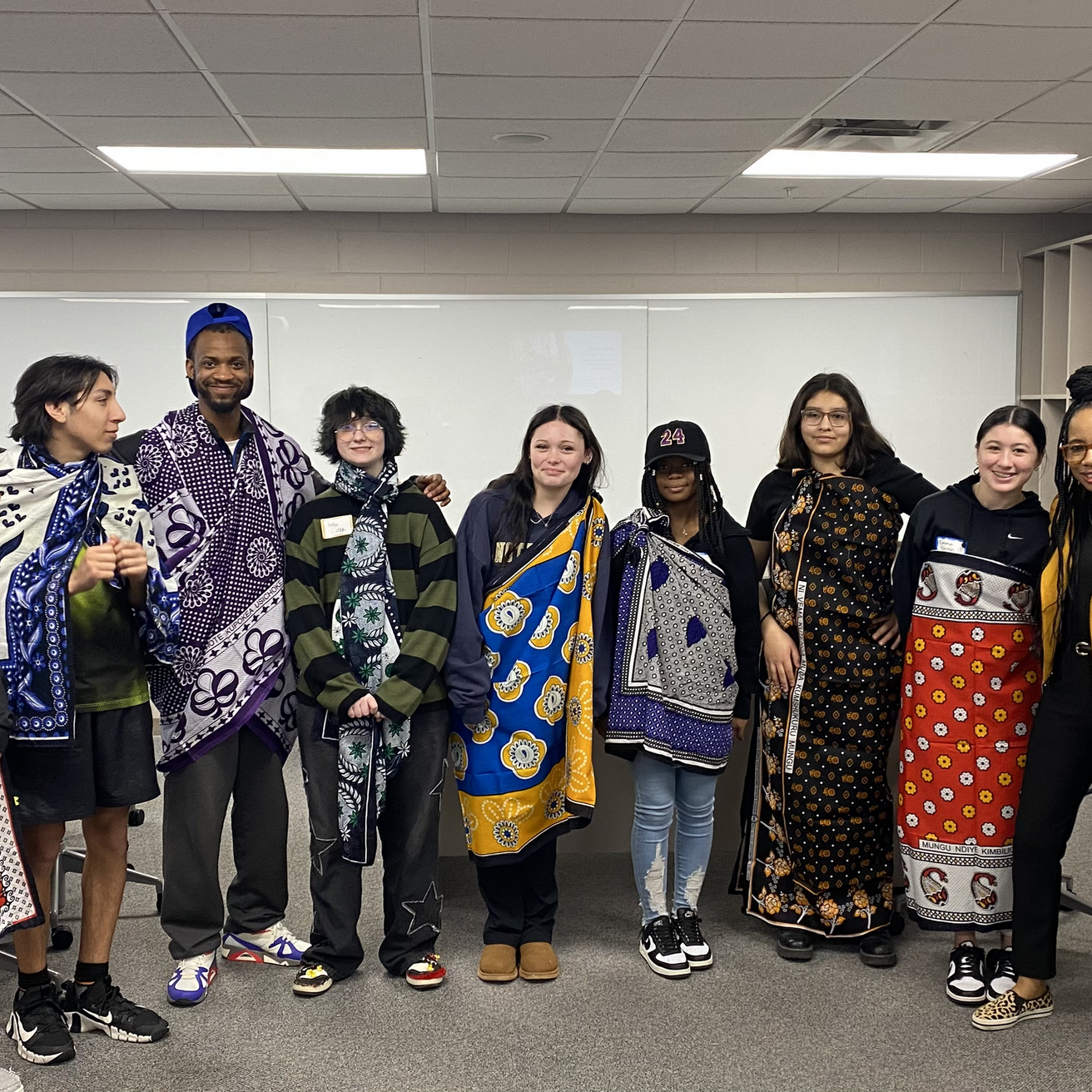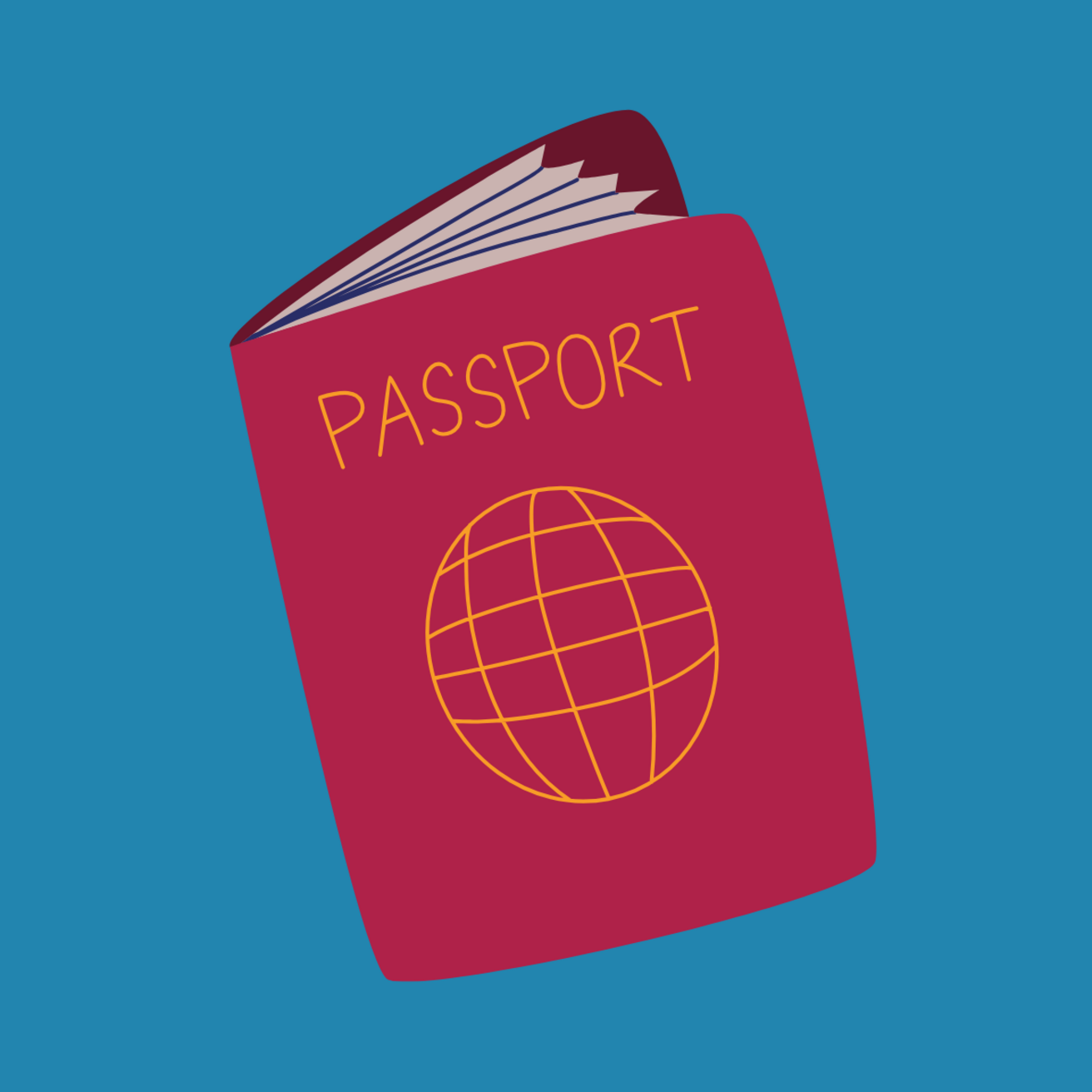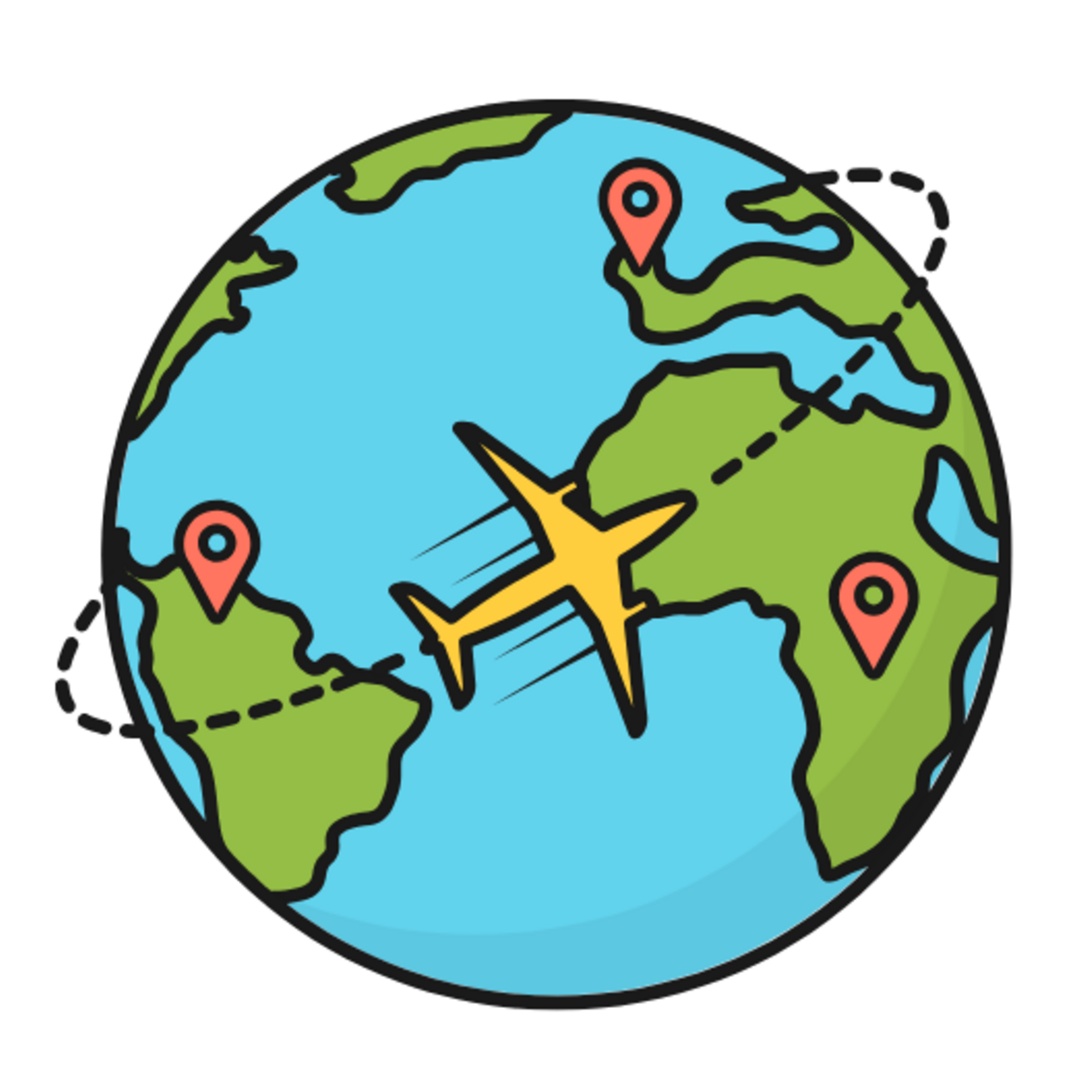"Please continue to do World Language Day! It was an awesome day for students. I really enjoyed it and it was a great way for students to experience campus, to see how language study can be used in the real world, and to have exposure to new languages not taught at the high school level, too!"
"I loved that students had the opportunity to learn about culture in the micro-teaching sessions, which were very relevant to their age and interest! For example, the ASL session was amazing. That one of the presenters was a deaf person and that students got to see signing in action was impactful!"
"I loved everything! It was a great event that builds excitement for continuing with languages at the post-secondary level and it also informed students about where language learning can take someone in their life or career."
"I was really interested in the sessions about language and the brain!"

Spring 2025 Schedule of Events
8:45 - 9:15: Check-In
Phillips Hall 100
Check in and get your passport and information for the day.
9:20 - 10:00: VIP Lounge
Phillips Hall 120 (CLCL) & 318
Attendees will have time to peruse our program offerings, getting a taste of the kinds of things that you can learn in our different academic disciplines. This will include mini-games, activities, and time to chat with faculty and student ambassadors!
See below for some of what we will have to offer | ||
|---|---|---|
Greek & Latin: Writing on the Wall (Classics) | Where in the World: Landmark Challenge (International Studies) | Che Gesto È? (What’s the Gesture?) (Italian) |
Real or Fake Italian? (Italian) | Origami Cranes (Japanese) | Hyakunin Isshu Karuta (Japanese) |
Linguistics Jeopardy! (Linguistics) | Guess the Language (Linguistics) | Tanzanian Wildlife: Can You Guess the Animal’s Swahili Name? (Swahili) |
Could You Survive Kilimanjaro (Swahili) | Translating Emojis (Translation) | Moving from Learning to Teacher (College of Education) |
10:00 - 12:00: First Class
Sit in on various short lessons from University faculty and get a taste of what it's like to be in our classes!
PHILLIPS HALL 214 | Phillips Hall 612 | PHILLIPS HALL 318 | Phillips Hall 529 | |
|---|---|---|---|---|
10:10-10:40 | Language in Mind with Ethan Kutlu, Emerson Peters, & Jacob Boudreau Have you ever wondered how your brain comes up with a word like sigma? Do you want to know what happens in your brain when it processes colors and words or whether your eyes are truly the window to your mind? Psycholinguistics can answer these questions. Join us for interactive experiments and discover how your brain processes language in everyday life. | Encouraging Korean Expressions with Sang-Seok Yoon In this session, we will explore Korean expressions that reflect Koreans’ attitudes toward life. By learning commonly used phrases such as Hal su isseo! (“I/You can do it!”) and Wanbyeukhaji anado gwaenchanha! (“It’s okay not to be perfect!”), participants will gain insight into how Koreans navigate and persevere in a highly competitive society. We will also discuss how these attitudes are reflected in K-pop songs, including BTS’s “Love Myself,” Stray Kids’s “MIROH,” and ITZY’s “WANNABE.” | Global Citizenship and English as the World's Lingua Franca with Peter Gerlach In this session, we will explore the place of English in the community of over 7,000 languages spoken around the world. What are the most commonly spoken languages today? Does English have an outsized influence globally? In addition, students will get to explore some less commonly spoken and indigenous languages! We’ll also learn about language justice and what can happen to local and individual identities when people choose English instead. | French Kiss: Cultural Misunderstandings In this session, we will explore common cultural misunderstandings between France and the U.S., from differing social norms to language pitfalls and stereotypes. Participants will gain insight into how these cultural misinterpretations arise and how to navigate them with greater awareness. Whether it's the meaning of a casual kiss on the cheek, attitudes toward politeness, or humor that doesn’t translate, this session will help bridge the gap between French and American perspectives with humor and cultural sensitivity. |
| ||||
10:50-11:20 | French Kiss: Cultural Misunderstandings In this session, we will explore common cultural misunderstandings between France and the U.S., from differing social norms to language pitfalls and stereotypes. Participants will gain insight into how these cultural misinterpretations arise and how to navigate them with greater awareness. Whether it's the meaning of a casual kiss on the cheek, attitudes toward politeness, or humor that doesn’t translate, this session will help bridge the gap between French and American perspectives with humor and cultural sensitivity. | Deaf Mythbusters! with Becca Clark & Steven Jones Many of us have seen, heard, or read varying views on deaf people and Deaf culture. However, many of these views are misconceptions. For example, many believe that American Sign Language isn’t a “real” language, but it has been shown to be a complete language, with its own grammar and structure. In this session, we will debunk myths related to deaf people and Deaf culture and you will have an opportunity to ask the ASL faculty members anything! | Baba Yaga: The Mysterious Witch of Slavic Folklore with Irina Kostina In this session, we will consider what you already know about the Baba Yaga and learn more about her, including the origin of her name, her changing appearance, the characteristics of her signature house, and her modern representations in videogames. You will also receive a copy of the fairytale “Baba Yaga” in English. | Gummy Delights and Beyond - "Made in Germany" with Kirsten Kumpf Baele This interactive experience will give students a hands-on exploration of German culture and innovation. Through a grab box activity, students will use their sense of touch to identify various German-made products – everything from iconic sweets to everyday items that might surprise them. They’ll discover the global impact of German creativity and craftsmanship in their daily lives. As a sweet finale, students will leave with a few samples of German treats to enjoy. This unique event highlights how languages, culture, and commerce intersect. Who knew that what we use, taste, and experience every day could trace its origins back to Germany? |
| ||||
11:30-12:00 | Speak Like a Roman! with Marcia Lindgren What did Greek speakers in the Roman Empire do when they wanted to learn Latin? What did Latin speakers do when they wanted to learn Greek? They used authentic dialogues (colloquia) about daily life in the ancient world, very much like today’s phrasebooks for travelers. In this session, we’ll have conversations on topics like going out for lunch, visiting a sick friend, or going to the public baths! Agōmen loipon! Eamus iam! Let’s go now! | Beyond the Baguette: Investigating French Stereotypes with Celeste Miller Berets, baguettes, and romance – these are just a few of the clichés about France that pop culture loves to reinforce. But how true are they? This session takes a closer look at common stereotypes and investigates their origin, contrasting them with the realities of modern French culture. Get ready to challenge what you think you know and discover a France that goes far beyond the Eiffel Tower! | Translating Waves to Words with Jill Beckman In this session, you’ll dive into the fascinating world of acoustic phonetics! You will record your own voice and explore the intricate relationship between spoken words and the sound waves they create. Uncover the science behind speech and gain hands-on experience in analyzing your recordings. This session will offer a unique opportunity to transform your understanding of language and sound! | When Two Languages Start Dating: The Story of Spanglish Around the World with Giovanni Zimotti What happens when speakers of one language come into contact with speakers of another language? Languages start to mix and mingle. Sometimes a new language is born, while other times people start alternating between one language and the other. In this session, we will explore the linguistic phenomenon of language in contact by learning about Spanglish around the world. |
12:00 - 1:15: Lunch
Phillips Hall 120 (CLCL)
We will be hosting a pizza lunch in the CLCL, which will be perfect time to talk about what you've learned so far today.
1:20 - 2:20: Final Approach
Another round to sit in on short lessons from University faculty and see what college classrooms are like!
Phillips Hall 19 | Phillips Hall 216 | Phillips Hall 321 | Phillips Hall 318 | |
|---|---|---|---|---|
1:20-1:40 | Deaf Mythbusters! with Tim Sheets & Ovi Velasquez Many of us have seen, heard, or read varying views on deaf people and Deaf culture. However, many of these views are misconceptions. For example, many believe that American Sign Language isn’t a “real” language, but it has been shown to be a complete language, with its own grammar and structure. In this session, we will debunk myths related to deaf people and Deaf culture and you will have an opportunity to ask the ASL faculty members anything! | The Fabric that Speaks with Suzy Nkurlu & Kipsang Shadrack Have you ever heard of a cloth that speaks? In this session, we will introduce learners to East Africa’s culture through kanga and its use for communication purposes. East Africa is proud of this unique clothing that has various styles and is used in a variety of occasions including weddings, funerals, political gatherings, among others. Unlike fabrics from different parts of the world, kanga prints carry different meanings, including moral, social, educational, and political messages. Therefore, learners will gain an enduring understanding of the different messages that are carried through East Africa’s famous dress code. | Gummy Delights and Beyond - "Made in Germany" with Kirsten Kumpf Baele This interactive experience will give students a hands-on exploration of German culture and innovation. Through a grab box activity, students will use their sense of touch to identify various German-made products – everything from iconic sweets to everyday items that might surprise them. They’ll discover the global impact of German creativity and craftsmanship in their daily lives. As a sweet finale, students will leave with a few samples of German treats to enjoy. This unique event highlights how languages, culture, and commerce intersect. Who knew that what we use, taste, and experience every day could trace its origins back to Germany? | Crack the Communication Code with Diana Thow, Adrienne Rose, & Miharu Yano Did you know that all of us already use translation in our day-to-day lives? We move between different tones, vocabularies, and voices to effectively communicate to those around us. In this session, we’ll engage in an interactive activity that asks you to consider a problem and appeal to different groups of people for a solution. Together, we’ll think through questions like: Who is your audience and what strategies should you use to effectively reach them? What kind of language would they respond to most? How can you tweak your approach to be understood? |
| ||||
1:40-2:00 | Anime to Zen with Kendra Strand Japanese pop culture is full of thoughtful topics, from philosophy and mindfulness to aesthetics and environmental issues. Dive into the vibrant world of anime and manga to explore how historical themes make an impact in our lives today. Whether you’re a long-time anime fan or a master of meditation, you can always uncover new perspectives on visual media from A to Z. | The (Un)glamorous Mobster: The True Face of Organized Crime with Irene Lottini Sharply tailored suits, polished shoes, and expensive watches: over the last fifty years, successful movies and TV series have contributed to shaping the stereotypical image of a mobster. But is this portrayal accurate? What do mafia bosses really look like? How do they live? This session will unveil the dark realities of Italian organized crime and will explore its complex nature. Get ready to be surprised! | We Are What We Eat: Food Culture in the Middle East & North Africa with Asma Ben Romdhane & Yasmine Ramadan Our dynamic session will explore the rich culinary traditions of the Middle East/North Africa (MENA) region. Through interactive discussions, you will uncover how food reflects language, history, and culture. Get ready to taste, learn, and discover the fascinating connections between food and identity in this vibrant part of the world! | Decoding Brazilian Memes: Humor, Language, and Culture with Mariana Ruiz Nascimiento In this session, students will explore popular Brazilian memes, their cultural significance, and how they reflect Brazilian society and language. They will discover how memes shape digital communication in Portuguese and how humor and internet culture serve as a bridge connecting people across different cultures. |
| ||||
2:00-2:20 | When Two Languages Start Dating: The Story of Spanglish Around the World with Giovanni Zimotti What happens when speakers of one language come into contact with speakers of another language? Languages start to mix and mingle. Sometimes a new language is born, while other times people start alternating between one language and the other. In this session, we will explore the linguistic phenomenon of language in contact by learning about Spanglish around the world. | Rhythms of Latin Music with Denise Filios Can you feel the beat? Clap it, stamp it, tap it out! Shake it, snap it – let’s make some noise! In this session, you’ll try our simple percussion instruments and groove to the beats of popular Latin songs. We’ll explore rhythm (compás, tempo, tiempos), how to recognize it, and why it makes music so exciting! | Culture Shock Experiencing other cultures often leads to discomfort. In this session, we will watch a short video that may provoke culture shock. In general, we will learn how to better understand and adapt to the discomfort of culture shock. More specifically, you will learn more about yourself by examining more closely what makes you feel uncomfortable. | Echos of the Plateau: Tibetan Guozhuang Dance with Huiqiang Zheng Originating from the tradition of Tibetans dancing around a campfire, the circle Guozhuang Dance symbolizes unity, harmony, and community. In this session, students will immerse themselves in vibrant Tibetan cultural heritage, learning the dance movements while connecting with the lively rhythm of Tibetan music. Beyond the physical steps, students will gain a deeper understanding of how the dance reflects the bond between people and the natural world. Students will have an opportunity to experience the joy, spirit, and timeless energy of the Tibetan plateau while exploring the significance of community, culture, and nature. |
2:20 - 3:00: Customs
Phillips Hall 120 (CLCL) & 318
Attendees will have more time to interact in smaller groups with faculty and students from different world language and culture programs! Visit programs you may have missed the first time and follow up with interesting things you learning throughout the day!
See below for some of what we will have to offer | ||
|---|---|---|
Write Your Name in Arabic Calligraphy (Arabic) | Ancient Handwriting (Classics) | Where in the World: Landmark Challenge (International Studies) |
|
|
|
Che Gesto È? (What’s the Gesture?) (Italian) | Real or Fake Italian? (Italian) | Origami Cranes (Japanese) |
Hyakunin Isshu Karuta (Japanese) | Linguistics Jeopardy! (Linguistics) | Guess the Language (Linguistics) |
|
|
|
Cyrillic Code Breakers (Russian) | Truth or Trick? Russian Superstitions Challenge (Russian) | Tanzanian Wildlife: Can You Guess the Animal’s Swahili Name? (Swahili) |
Could You Survive Kilimanjaro (Swahili) | Translating Emojis (Translation) | Moving from Learning to Teacher (College of Education) |
3:00 - 3:30: Baggage Claim
Phillips Hall 120 (CLCL)
Wrap up the day by making your final rounds to talk with faculty, current students, and fellow attendees! Don't forget to get your branded water bottle or anything else you picked up throughout the day!

